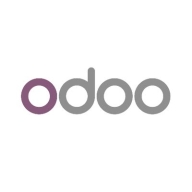

SAP S/4HANA and Odoo compete in the ERP category. Odoo has the upper hand in terms of adaptability and affordability due to its open-source nature and flexible deployment.
Features: SAP S/4HANA offers comprehensive integration, advanced analytics with an in-memory database, and a strong finance module. Odoo provides deep integration, wide customization capabilities across various modules, and user-friendly interfaces, all bolstered by its cost-saving open-source model.
Room for Improvement: SAP S/4HANA needs more user-friendly interfaces, better solutions for industry-specific needs, and reduced complexity during implementation. Odoo should focus on enhancing technical support, authorization management, and scaling capabilities, while addressing its reporting functionalities and frequent updates that contribute to a steep learning curve.
Ease of Deployment and Customer Service: SAP S/4HANA offers on-premises, hybrid, and cloud deployment options, with customer service quality varying based on service agreements. Odoo also supports diverse deployment models but shows particular strength in cloud solutions, which are economical for small to medium businesses. However, Odoo's support could benefit from faster response times and more specialized knowledge.
Pricing and ROI: SAP S/4HANA is expensive, with costs influenced by the deployment model and user numbers, making it less accessible for smaller businesses. Its ROI is recognized in the long term. Odoo, on the other hand, is more affordable, leveraging an open-source version and lower pricing structures to appeal to smaller businesses, offering flexibility and cost efficiency extensively.
Currently, I manage those tasks independently, which is a significant cost-saving measure for my small business.
It's not a matter of the solution; it's a matter of the clients and the approach that we follow.
We have observed a good return on investment, with calculations based on a five-year ROI plan.
There is an ROI, otherwise I would not buy it.
Technical support from Odoo is available and eager to help.
A traditional challenge with SAP support is that SAP teams only support the standard functions, which are part of the product.
Establishing the right channels was a challenge, as BTP was new to everyone, including our SAP contacts.
I would rate the support a ten because there are a lot of knowledge-based articles published, and most of them are available online.
I rate the scalability of Odoo as eight to nine out of ten.
SAP S/4HANA scales exceptionally well.
It is very easy to scale within businesses, especially when a new business falls within the range.
Scalability is a key strength of SAP, especially for HANA, compared to all the other ERPs.
Stability is very important because any software that supports your business must be available consistently.
The SAP HANA system is not very easy to unlock, and it's something strange as, compared to other databases, when transaction logs are full, you stop the system, run the transaction log backups, and then restart.
Not very often, but it can happen, especially with user load; if many people use the system at the same time, there might be issues depending on various factors.
I rate the stability of SAP S_4HANA as fairly stable because we have never experienced any downtime from SAP, and the performance is good.
Odoo's documentation needs improvement, as there are areas that are not well-documented.
Organizations face challenges like adapting to new technologies rapidly, and whether customers are early or late adopters influences their experience.
I can perform a lot of data manipulation directly on SAP using S-One, without having to resort to Excel, unlike with View ID.
The performance of the SAP interface could be improved.
The pricing for Odoo is affordable, with the solution being significantly cheaper than its competitors like SAP, Microsoft, and Oracle.
It's higher compared to similar peer solutions.
Most users or IT professionals typically criticize the high price of SAP license costs.
It's not easy to have a clear understanding of the price and the value, especially if I talk about the business transaction platform.
All modules in Odoo are integrated together, providing seamless transitions across various functionalities.
It enables the posting of transactions and allows us to see the impact across various application scenarios, providing significant benefits for business.
The way SAP has helped our customers is by establishing a discipline where industry-specific operations and SAP's standard processes work hand in hand, improving resource utilization, material movement control, and cost control.
The insights given help us make strategic decisions.


Odoo is a suite of open source business apps that cover all your company needs: CRM, eCommerce, accounting, inventory, point of sale, project management, etc. Odoo's unique value proposition is to be at the same time very easy to use and fully integrated.
SAP S4HANA is an ERP (enterprise resource planning) system that uses sophisticated technologies including machine learning and AI. It is most commonly used to integrate and manage business functions and is an ideal solution for large enterprises. The platform includes supplier relationship management (SRM), customer relationship management (CRM), supply chain management (SCM), and product lifecycle management (PLM) functionality.
SAP S4HANA offers three different deployment options:
SAP S4HANA Features
SAP S4HANA has many valuable key features, including:
SAP S4HANA Benefits
Some of the benefits of using SAP S4HANA include:
Reviews from Real Users
Below are some reviews and helpful feedback written by SAP S4HANA users.
A Mechanical Engineer at a construction company says, “It is a very powerful, highly customizable tool. The most valuable feature is that the reporting is fast. We can see the results from that in that our commissions come in fast. That is the main advantage.”
Another reviewer, a SAP Technology Manager at a financial services firm, mentions, "It is more or less a very, very smooth and seamless product. Day by day they are increasing their technology features and they are keen to resolve the issues. India has a complex business scenario and SAP is thinking about that and resolving the issues day by day. In terms of the features I have found most valuable, I don't think that there is any lack or any gap process-wise. SAP is a very good tool."
A Project and Service delivery Manager at a tech services company comments, "One of the most valuable features, which we used the most, was the FI module, for finance. It involved controlling, account receivables, account payables, and complete financial steering."
A Senior Architect at a construction company states, “The POD applications are very useful to us. There are a few POD apps which we are using for different business scenarios. They are quite interesting.” He also adds, “The initial setup is pretty straightforward. The documentation is very good. The solution can scale well. The solution is stable.”
We monitor all ERP reviews to prevent fraudulent reviews and keep review quality high. We do not post reviews by company employees or direct competitors. We validate each review for authenticity via cross-reference with LinkedIn, and personal follow-up with the reviewer when necessary.